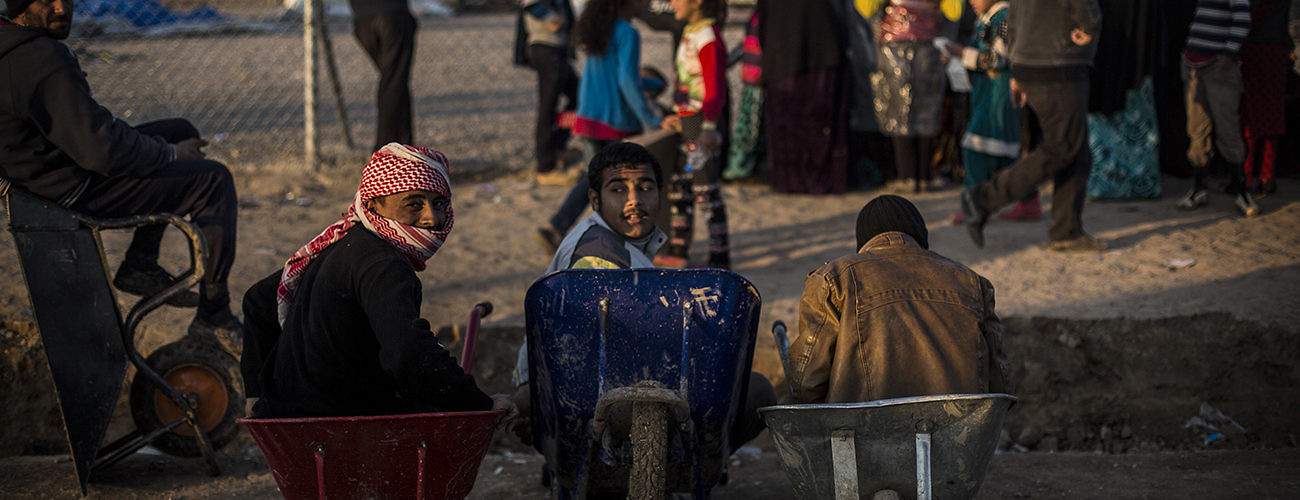Kurdish youth in a camp for people displaced by ISIS violence. Iraqi Kurdistan, December 12, 2016. (Manu Brabo/Associated Press)
The Islamic State and other parties to the ongoing conflict in Iraq and its wider region are alleged to have committed serious crimes under international law, including massacres of ethnic minorities. The United Nations Security Council has, however, been unwilling to refer these matters to the International Criminal Court. In its absence, foreign diplomats and lawyers are known to be working with the Kurdistan Regional Government (KRG) to establish its own independent tribunal. Could this be a viable alternative for pursuing justice?
Since Iraq is not a member of the ICC, the court’s prosecutors can’t initiate investigations of the country proprio motu (on their own initiative). As long as the Iraqi government also refuses to formally allow the court to do so, the only possibility would be for the Security Council to refer the situation to The Hague or, as in cases involving the former Yugoslavia and Rwanda in the 1990s, establish an independent tribunal. Yet the council is deeply divided on issues related to ISIS and the battles still raging in Iraq and Syria, due to the conflicting foreign policy interests of its permanent members.
Even if the ICC were to prosecute crimes in Iraq, it would likely only focus on a few high-level perpetrators and have no mechanism for trying lower-ranking soldiers. In the absence of an international, or even national Iraqi solution, Kurdistan is pushing forward with the tribunal, which would operate under its own laws. The design is still in its very early stages, but once established the court would seek jurisdiction over the core international crimes, namely genocide, crimes against humanity, and war crimes.
The new institution would be composed of international and Kurdish judges and have its seat in northern Iraq, according to Stephen Rapp, former United States Ambassador-at-Large for Global Criminal Justice, who is involved in the process. “It would be an internationalized mechanism in the Kurdish justice system,” Rapp told me.
The key to being able to establish such a court is Kurdistan’s status within Iraq. The region stretches from the borders of Turkey and Syria in the West to the Iranian border in the East and includes the major cities of Kirkuk and Erbil. It enjoys considerable independence under the Iraqi federal constitution, including exclusive rights in the judicial field and its own regional government that can pass laws and conclude agreements with foreign entities, including the UN.
According to Vanderbilt Law School Professor Michael Newton, there seems to be the necessary political will to establish the new tribunal. “Current planning and guidance from KRG officials is absolutely clear that they seek to create a truly internationalized tribunal that embodies the best practices drawn from other tribunals,” he told me. Newton is working with the Kurdish government on a draft law, but did not wish to comment on the details.
While there may be growing support among Kurdish politicians, establishing the jurisdiction of the court remains a contentious issue. For example, the Sinjar mountains, where ISIS began one of its worst massacres against the Yazidi community, do not formally belong to the Kurdistan region. Neither does the city of Mosul, where both Iraqi militias and government forces are said to have committed grave crimes in recent weeks.
Although Kurdish Peshmerga forces control a larger territory than that governed by the KRG, including the Sinjar region, Kurdish laws do not apply there. The Iraqi penal code does, however, include a provision that would permit the Iraqi Ministry of Interior to waive its own jurisdiction over crimes committed outside this territory through a simple administrative act.
A Kurdish tribunal would have an advantage over the Iraqi penal code in that the latter does not extend to those core international crimes of genocide, crimes against humanity, and war crimes. “The creation of a KRG tribunal is infinitely preferable to Baghdad taking the de fault approach of using their own domestic terrorism statutes [as a place holder],” Newton said.
While the legal foundation is being developed, investigators on the ground are already attempting to gather material that could serve as potential evidence in future trials within the tribunal. The International Commission on Missing Persons (ICMP) started to train and support local investigators and forensic specialists in Kurdistan earlier this year in securing evidence, recovering human remains and, most importantly, establishing a robust chain of custody to protect evidence.
An important part of this work is the protection of graves of the victims of alleged crimes, and, in a secondary step, recovering surface materials such as human remains or clothing that could be used to identify the victims in criminal proceedings. According to Trefor Williams, the head of ICMP’s Iraq program, there are 30 main burial sites in the Sinjar area alone. Some of these lie in territories where the fighting continues, though in the last few months ISIS has lost large parts of the area it once controlled, allowing increased access for local investigators.
About 100 ISIS fighters are currently in the custody of Kurdish authorities in Erbil and could be tried by the new tribunal. One of the high-level captives is Nasrin As’ad Ibrahim, the widow of Abu Sayyaf, a senior leader of the extremist group. She was taken and transferred to Kurdish authorities after Sayyaf was killed during a US military operation last year. Under the existing laws she can only be prosecuted for supporting a terrorist organization, whcih could be expanded under the new tribunal.
The overall outlook of those involved in establishing the new institution is best expressed by Newton. “A Kurdish tribunal would essentially represent the front line judicial fight on behalf of the entire civilized world,” he said.
Benjamin Duerr is an international criminal law analyst based in The Hague. Follow @benjaminduerr





